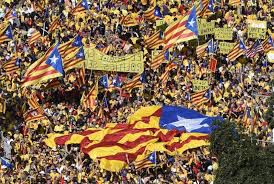Catalonia’s recent referendum signaling dire implications for the Spanish state

Catalonia’s recent referendum signaling dire implications for the Spanish state
October 3, 2017
Visca Barça! is the war cry of the Catalonian fans when cheering for their beloved FC Barcelona. If you are more of a Madrid fan or don’t care much for La Liga (or soccer for that matter), you roll your eyes and don’t really think too much of it. If you know some Spanish though, you would at least ask what “Visca” means. If Google Translate is correct (as many first year language students so desperately hope), “Visca” is Catalan’s equivalent to Spanish’s “Viva.” So what? Why not say “Viva!” then?
Few realize that everything about FC Barcelona—its colors, its crest, its stadium, as well as its chants and songs are the embodiment of Catalonia’s nationalist sentiment. This sentiment is now on the global stage, as millions of Catalonians assembled in the streets to determine their destiny on Oct. 1. In what the Catalonian Parliament is now calling a binding referendum, 90 percent of voters who participated in the referendum voted “Yes” to the region’s independence.
This movement has been gaining momentum for some time now. Under Francisco Franco’s oppressive 35-year dictatorship, Catalonians were subjugated under harsh policies, forcing Catalonians to forfeit Catalonia in any official context, as well as any and all autonomy the region enjoyed. The Post-Franco Constitution once again granted Catalonia semi-autonomous powers, giving it jurisdiction over most functions of local government, as well as complete jurisdiction over culture and the environment.
However, tension has been building between the region and the central government since Catalonia’s most recent parliamentary elections, where a coalition of pro-independence candidates won a majority of parliamentary seats. Catalonians have expressed a great deal of discontent with the central government in Madrid.
The Economist reports that economic forces—as always—are largely at play in the public’s reasoning for independence. Spain’s recent economic crisis coupled with the central government’s high taxing of the Catalonians has led some forces to believe that the region would fare better on its own. Considering that almost 20 percent of Spain’s GDP derives from Catalonia, Spain will not let the region go so easily.
If a nation within a state, or a territory within a state declares itself independent under the argument of popular sovereignty, then what must the central government do? What must the international community do? Are referendums not a democratic right, and can’t a democracy only work with the consent of its people? In this event, is Catalonia’s referendum legitimate if it does not share the consent of the central government in Madrid? Should this be seen as a legitimate cry for independence or another ripple in the wave of populism currently plaguing Europe and the world?
The implications of this event are dire, and I do not wish to side with either party. However, as a spectator and a student of political science, I can only wonder what kind of implications this event can continue to have in Spain, as well as the rest of the world. Spain’s Basque region, a region that has been historically even more zealous of its separate cultural and ethnic identity with the Spanish nation will surely follow suit. Despite Scotland’s previous referendum, the Scottish may again decide to bring their sovereignty to a vote. Will this signal a domino effect as seen with the demonstrations for democracy during the Arab Spring (and we all know how that turned out)?
Only time will tell what will happen, but we are currently seeing history unfold. Let’s hope everything remains civil when so much is at stake.





